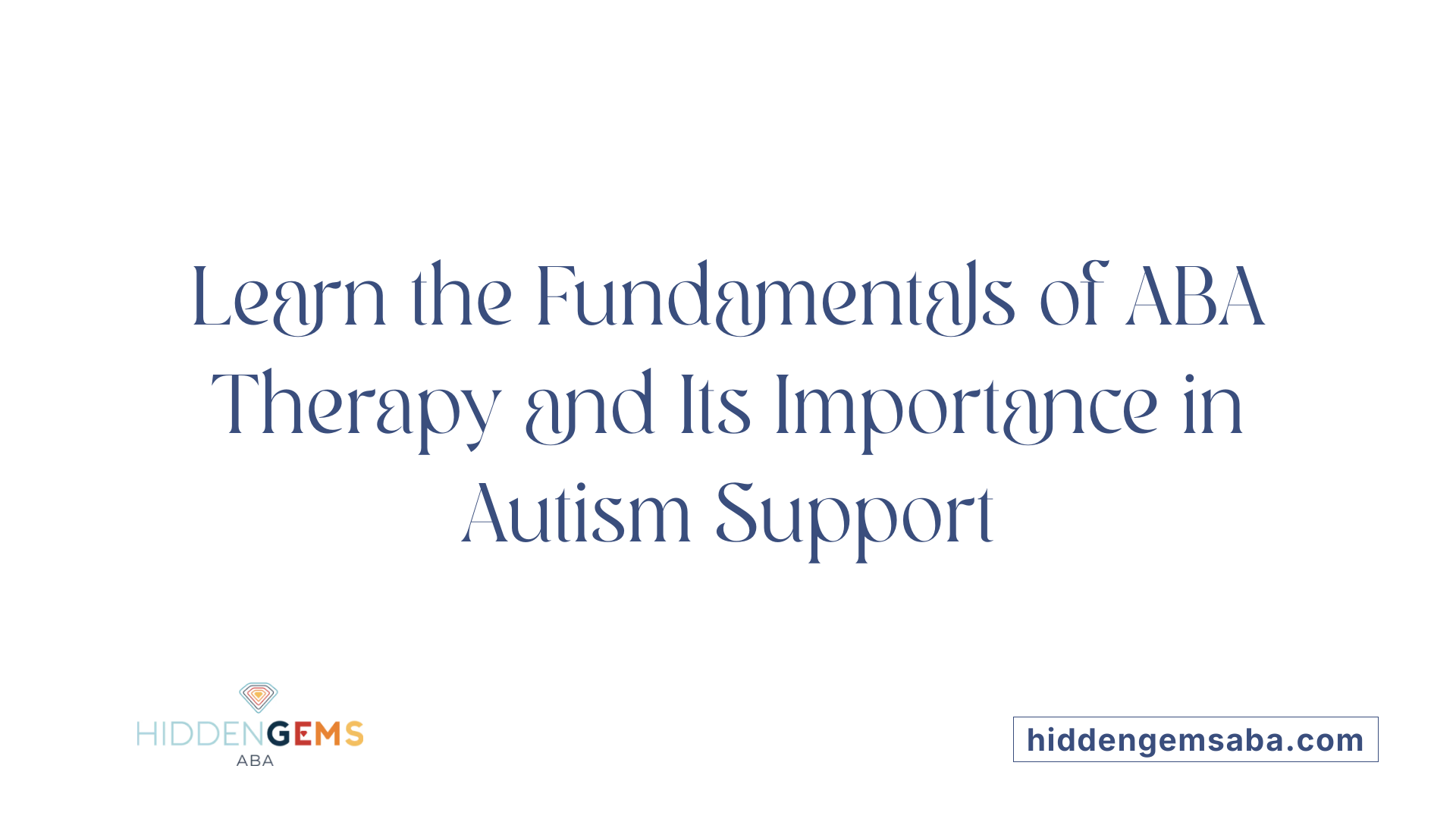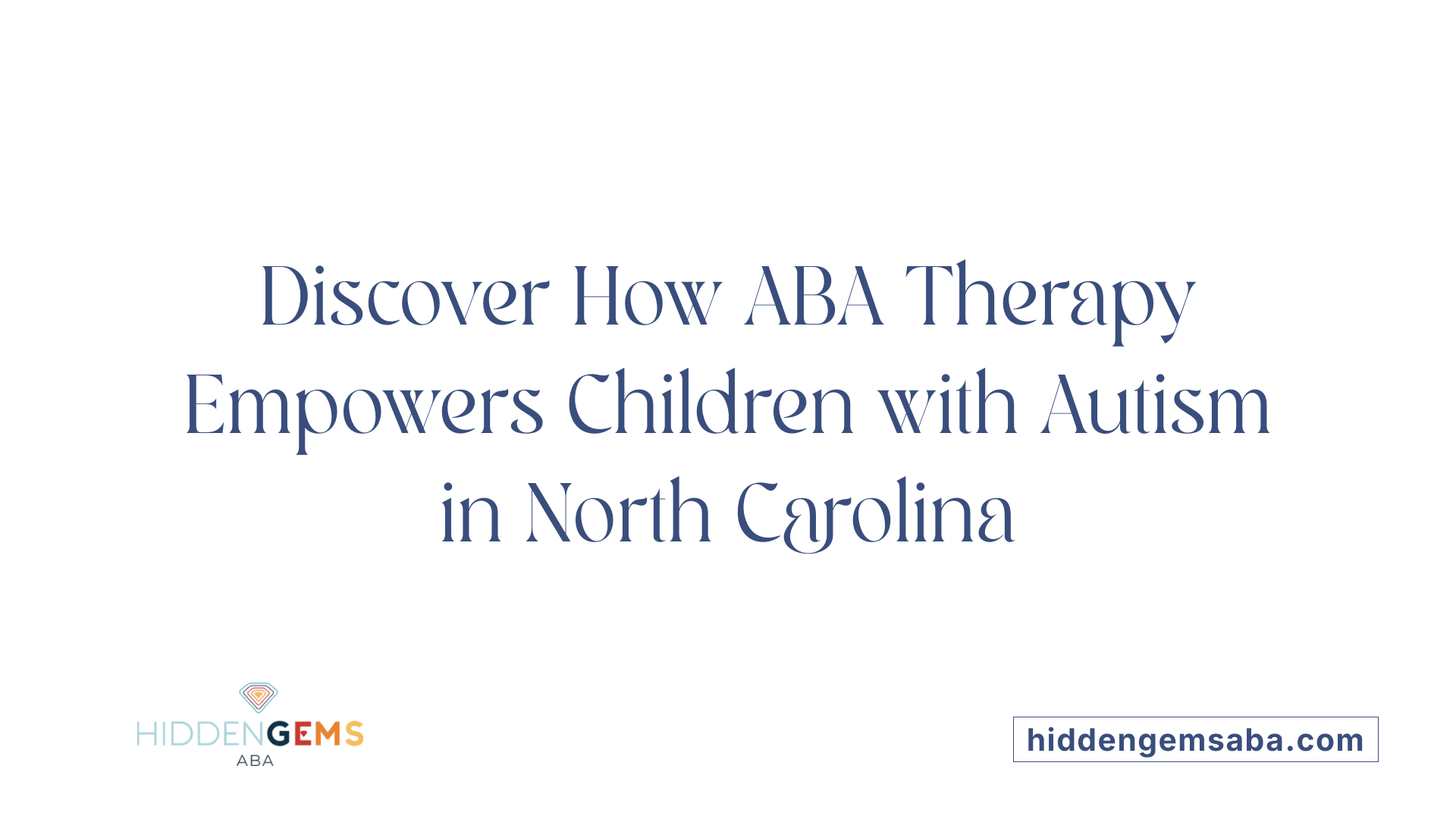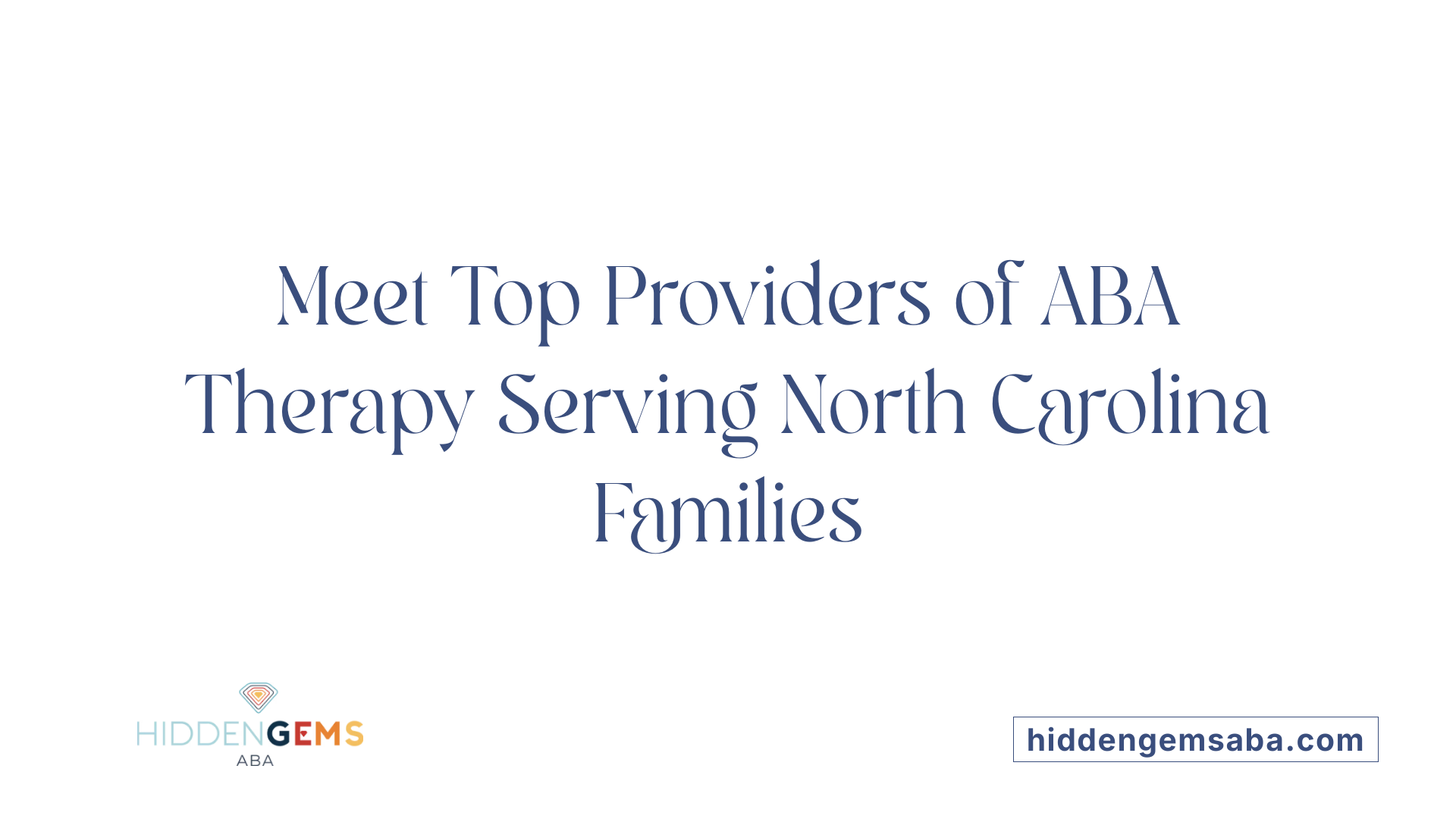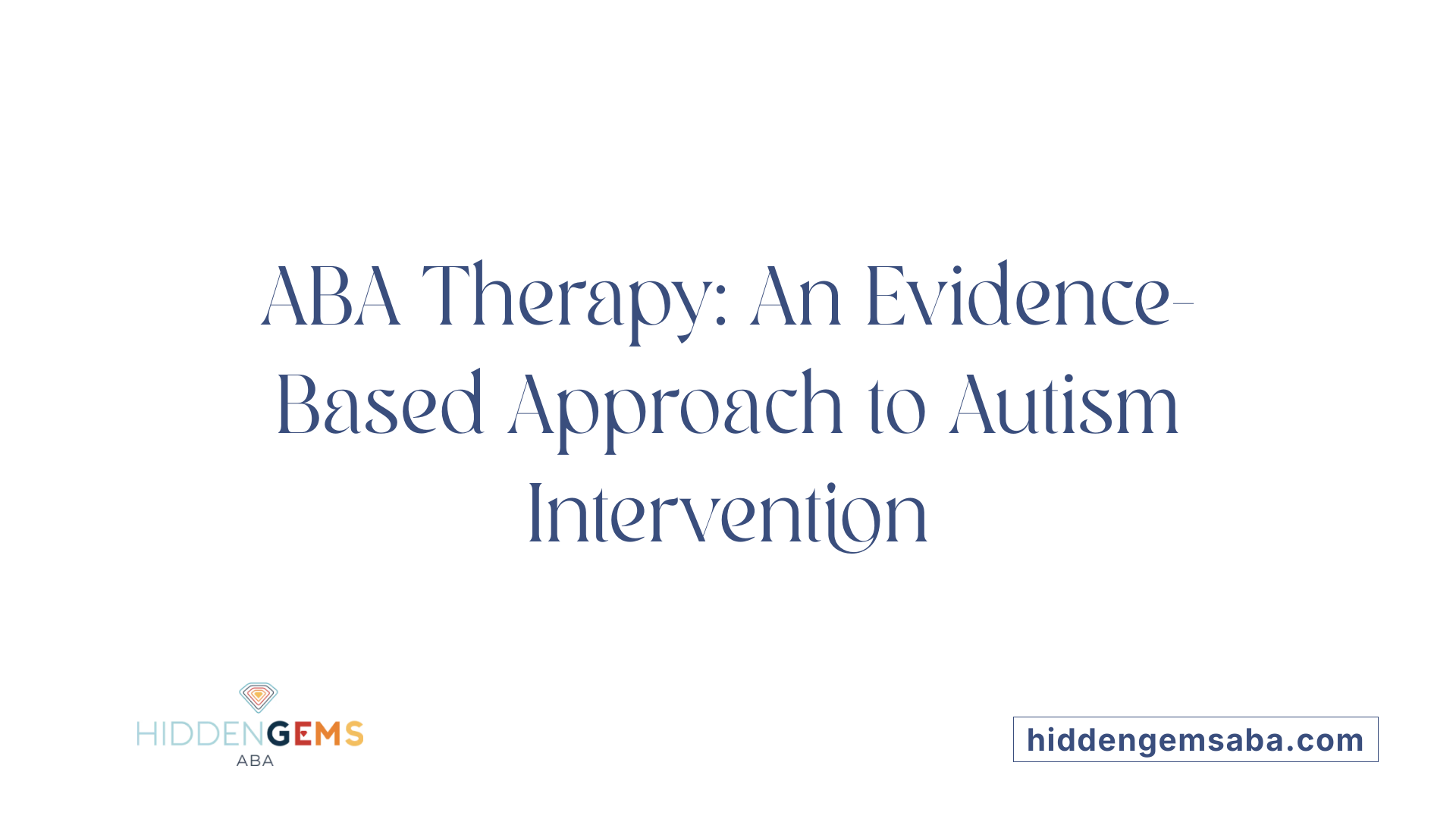Introduction to ABA Therapy and Its Growing Importance in North Carolina
Applied Behavior Analysis (ABA) therapy is a vital, evidence-based approach used to support children and individuals with autism spectrum disorder. In North Carolina, the increasing focus on autism services has boosted the demand for qualified ABA therapists. This article delves into how much ABA therapists make in North Carolina, examining salary trends, educational influences, and the roles of these professionals in the state's specialized autism care landscape.
Understanding ABA Therapy and Its Role in Autism Support

What is Applied Behavior Analysis (ABA) therapy?
Applied Behavior Analysis (ABA) therapy is a research-supported behavioral intervention designed primarily for individuals with autism spectrum disorder and other developmental conditions. It focuses on improving essential skills such as social interaction, communication, and learning through the systematic application of behavior principles.
Objectives and Methodologies
The core objective of ABA therapy is to encourage desirable behaviors and reduce behaviors that interfere with learning or socialization. This is achieved using techniques like positive reinforcement, where desired behaviors are rewarded to increase their frequency. Treatment plans are highly individualized and developed with the guidance of Board Certified Behavior Analysts (BCBAs) to fit each person's needs.
Several methodologies are commonly used in ABA therapy. These include Discrete Trial Training (DTT), which provides structured sessions with clear instructions and rewards; Pivotal Response Treatment (PRT), which focuses on motivation and responding to multiple cues in natural settings; and the Early Start Denver Model (ESDM), a play-based approach designed for young children. Intensive ABA therapy, typically delivered for more than 20 hours per week in early childhood, can produce meaningful developmental improvements when continuously tailored through assessments.
Evidence-Based Nature of ABA
ABA is recognized as an evidence-based practice, supported by numerous clinical studies demonstrating its effectiveness in enhancing communication, social skills, and reducing challenging behaviors. Its success in measurable improvements underscores its vital role in autism support, making it a cornerstone intervention in many therapeutic programs worldwide, including those in North Carolina where specialized ABA services are tailored for children on the spectrum.
How ABA Therapy Benefits Individuals with Autism in North Carolina

How does ABA therapy help individuals with autism?
ABA (Applied Behavior Analysis) therapy supports individuals with autism by focusing on the development of vital skills tailored to each person's unique needs. By using positive reinforcement, therapists encourage behaviors like communication, social interaction, and self-care, essential for daily functioning and greater independence.
Skill development through ABA
ABA therapy systematically teaches children with autism spectrum disorder various behavioral, communication, and social skills. In North Carolina, this is especially important as many providers design focused interventions to address developmental challenges faced by this population. Therapists help breakdown complex skills into achievable steps, ensuring progress can be measured and reinforced.
Personalization of therapy
ABA interventions in North Carolina are highly personalized. Therapists like Mamie A. Turner, BCBA, work closely with families to tailor programs that reflect each child's specific requirements and environments, such as homes or clinics. This customization maximizes the therapy’s effectiveness and facilitates generalization of skills across settings.
Positive reinforcement impacts
Positive reinforcement remains a cornerstone of ABA therapy, encouraging desirable behaviors by rewarding progress. Such techniques not only enhance motivation but also foster lasting improvements in behavior and learning. Caregiver and family training provided by North Carolina ABA services further strengthen these outcomes by extending support beyond direct therapy sessions.
Through well-structured, scientifically-supported ABA programs, individuals with autism in North Carolina gain essential life skills leading to improved social engagement, communication, and self-sufficiency.
Key Providers of ABA Therapy in North Carolina

Who provides ABA therapy services?
ABA therapy in North Carolina is delivered by a diverse group of trained professionals. This includes Board-Certified Behavior Analysts (BCBAs), behavior therapists, and clinical assistants who collaborate to design and implement individualized intervention programs.
Many ABA providers operate within specialized clinics, autism centers, and school settings across North Carolina. Organizations such as NC Behavior, Lovely Day ABA & Autism Services, and Connect n Care ABA are notable local providers committed to serving children on the autism spectrum.
Professional roles delivering ABA
BCBAs play a critical role by conducting behavioral assessments, establishing therapy goals, and monitoring progress. They often supervise therapy assistants and paraprofessionals, who implement therapy activities under guidance. Experience and certification levels, such as BCBA-D, help increase the effectiveness and quality of services provided.
Collaboration with families
An essential element of ABA therapy in North Carolina involves careful collaboration between therapists and families. Professionals like Mamie A. Turner, a locally based BCBA, work closely with parents to tailor interventions that improve social skills, communication, problem behaviors, and self-care.
Therapists also provide training to caregivers and families, ensuring that positive behavioral changes continue beyond clinical sessions. Many ABA sessions occur in familiar settings like homes or clinics, promoting comfort and better learning outcomes for children.
This integrated approach helps strengthen support networks for children with autism spectrum disorder and ensures holistic development through consistent therapeutic engagement.
Common Techniques Used by ABA Therapists

What are the common techniques used in ABA therapy?
ABA therapy relies on a variety of effective methods to help children with autism spectrum disorder develop essential skills. One fundamental technique is discrete trial training (DTT), which breaks down complex skills into small, manageable steps. Therapists guide the child through repeated trials, providing clear prompts and immediate reinforcement for correct responses.
Another widely used approach is natural environment teaching (NET). Unlike DTT, NET takes place in the settings where the child naturally spends time, such as home or school. This method encourages learning through everyday activities, making it easier for the child to generalize new skills across different contexts.
Shaping is also a key strategy where therapists gradually reinforce closer approximations of the desired behavior, helping the child progress step-by-step toward the goal.
ABA practitioners heavily focus on the use of reinforcement strategies. Positive reinforcement encourages desired behaviors by providing rewards or praise, which increases the likelihood of those behaviors recurring. Therapists also use functional communication training to teach alternative ways to communicate needs, reducing challenging behaviors.
Data collection is integral to ABA therapy. Therapists consistently observe and record the child's behaviors, tracking progress with objective data. This information is analyzed to adjust teaching methods and reinforce strategies based on what works best for the individual.
The combination of these techniques, tailored to each child's unique needs and skills, helps improve communication, social interactions, self-care, and other important behaviors. Certified professionals such as Board Certified Behavior Analysts (BCBAs) and Registered Behavior Technicians (RBTs) supervise and implement these interventions to ensure effectiveness and safety.
The Evidence-Based Status of ABA Therapy

Is ABA therapy evidence-based?
Yes, ABA (Applied Behavior Analysis) therapy is widely recognized as an evidence-based practice, especially in supporting individuals with autism spectrum disorder (ASD). Over the past four decades, extensive research has demonstrated the significant positive impact of ABA interventions on various developmental areas.
Research supporting ABA outcomes
Studies show that ABA techniques effectively improve communication, language, cognitive, academic, adaptive skills, and social behaviors in children with ASD. The bulk of scientific research focuses on early interventions, particularly with children under the age of 10, where gains tend to be most pronounced.
Holistic and ethical approach evolution
The methodology of ABA has evolved from primarily relying on positive reinforcement and some punishment to adopting a more holistic, person-centered approach. This modern application emphasizes tailoring interventions to each individual's unique strengths and challenges while maintaining ethical standards. The focus lies on skill development and enhancing quality of life.
Long-term benefits for autism spectrum individuals
Long-term benefits of ABA therapy include increased social connections, improved employment prospects, greater independence, and reductions in problematic behaviors such as aggression and self-injury. Organizations like the Autism Science Foundation endorse its appropriate use by licensed and qualified practitioners, ensuring ethical administration and maximizing outcomes.
These factors collectively support ABA therapy's status as a scientifically validated and ethical treatment option for autism spectrum disorder, making it a cornerstone of behavioral interventions across settings worldwide.
Average Salary Overview for ABA Therapists in North Carolina
What Is the Average Annual Salary for ABA Therapists?
ABA therapists working full time earn an average annual salary of about $42,000. This figure offers a useful baseline for understanding compensation within the ABA field.
How Does Experience Influence ABA Therapist Salaries?
Salaries for ABA therapists tend to increase with years of experience. For example, new therapists with less than one year of experience earn roughly $16.01 per hour. In contrast, those with 10 to 19 years of experience earn about $22.08 per hour. This progression highlights the value of experience in boosting earnings over time.
How Does North Carolina Compare with Other Areas?
Geographical location has a significant impact on ABA therapist salaries. Nationally, states like California and New York offer higher pay, with average annual salaries of $62,712 and $55,215 respectively. In comparison, salaries in North Carolina are likely to be lower due to regional differences in cost of living and demand. Despite these variations, North Carolina remains actively involved in providing ABA therapy, particularly for children with autism spectrum disorder.
What Factors Can Increase An ABA Therapist’s Salary?
Higher education levels and certification status are strongly linked to increased pay. Therapists with a Master’s degree can earn around $56,000 annually. Further specialization, such as earning a BCBA or BCBA-D certification, can boost salaries to approximately $70,000 and $85,000 respectively. Employment in hospitals also tends to offer higher salaries, averaging $57,000 per year, reflecting the institutional demand for experienced therapists.
Factors Influencing ABA Therapist Salaries in North Carolina
How does experience and education impact ABA therapist salaries?
ABA therapist salaries see noticeable growth with increasing experience. Entry-level therapists with less than a year of experience earn around $16.01 per hour, while those with 10 to 19 years of experience can make about $22.08 per hour. Education also plays a vital role; therapists holding a Master's degree tend to earn approximately $56,000 annually, reflecting the value of advanced qualifications in this field.
What effect do certifications have on pay for ABA therapists?
Professional certifications significantly influence earnings among ABA therapists. Board Certified Behavior Analysts (BCBA) earn roughly $70,000 per year, and those holding a doctoral-level BCBA-D certification can expect around $85,000 annually. These credentials enhance a therapist’s expertise and typically lead to higher compensation.
How do organizational size and work setting influence salaries?
ABA therapists employed by larger organizations often enjoy higher salaries due to better resources and funding. Working in hospital settings is especially rewarding, with average salaries near $57,000 annually, which generally reflects seasoned therapists working under institutional conditions. This contrasts with smaller clinics or home-based services, which may offer lower pay but provide flexible or community-based interventions.
In North Carolina, where ABA therapy is widespread for children with autism, these factors contribute to salary variations. Local providers focus on comprehensive support, from direct therapy to caregiver training, setting a dynamic landscape for ABA professionals' compensation and career growth.
Educational Attainment and Its Impact on Earnings
How does holding a Master's degree compare to a Bachelor's degree in ABA therapy earnings?
ABA therapists holding a Master's degree earn significantly more than those with a Bachelor's degree. With a Master's, the average annual salary reaches about $56,000, reflecting specialized knowledge and advanced skills. This higher education level often opens doors to better-paying positions and responsibilities, contributing to the salary gap between degree holders.
What salary uplift comes with advanced degrees in ABA therapy?
The salary uplift associated with advanced degrees is notable. While entry-level ABA therapists, often with a Bachelor's or less than a year of experience, earn hourly wages around $16.01, those with 10-19 years of experience and likely advanced education earn approximately $22.08 per hour. This progression highlights how experience coupled with education leads to improved compensation.
Why are professional certifications important for ABA therapist salaries?
Professional certifications like BCBA (Board Certified Behavior Analyst) and BCBA-D (Doctoral level) play a crucial role in elevating salaries. Certified BCBAs earn around $70,000 annually, while BCBA-Ds command about $85,000. These certifications signify a high level of expertise, which employers recognize through better pay. Consequently, obtaining these credentials can be a strategic move for therapists aiming to increase their earnings and advance their careers.
Salary Progression by Experience and Certification
How does hourly wage grow with years of experience?
ABA therapists see a clear increase in hourly wages as they gain more experience. Those with less than one year in the field earn around $16.01 per hour on average. As therapists advance to 10-19 years of experience, this rate rises to approximately $22.08 per hour. This gradual growth reflects the value placed on experience in the profession, rewarding therapists who dedicate time to mastering and refining their skills.
How do BCBA and BCBA-D salaries compare?
Certification significantly affects salary potential in the ABA therapy field. Board Certified Behavior Analysts (BCBA) typically earn about $70,000 annually, marking a substantial increase over the average ABA therapist salary. Those with a Doctorate-level credential, BCBA-D, command even higher salaries, around $85,000 per year. This difference highlights the premium placed on advanced clinical expertise and educational attainment.
In what ways does certification boost income potential?
Certification elevates therapists' professional standing and enables access to higher-paying roles, particularly in clinical and institutional settings. Beyond just increasing base pay, credentials such as BCBA and BCBA-D open doors to leadership positions and specialized services that command premium compensation. Achieving these certifications is a strategic investment for ABA therapists aiming to enhance both their skills and remuneration over time.
Work Settings and Salary Variations
How Do Salaries Differ Between Hospitals, Clinics, and Home-Based Therapy?
ABA therapists' pay varies notably depending on where they work. Those employed in hospitals often earn higher salaries, averaging about $57,000 per year. This reflects the institutional setting which may require additional qualifications or experience. Conversely, therapists working in clinics or providing home-based therapy typically have more variable earnings influenced by employer size and local demand.
What Impact Does Employer Type Have on ABA Therapist Pay?
Employer type plays a crucial role in salary levels. Larger organizations tend to offer higher wages, partly because they have more resources and might demand higher credentials. For instance, ABA therapists holding a Master's degree often earn around $56,000 annually, signaling that educational background combined with a reputable employer lifts earnings.
What Are Common Workplace Environments for ABA Therapists in North Carolina?
In North Carolina, ABA therapy services often take place in familiar and flexible environments such as homes or clinics. Many providers—including NC Behavior, Lovely Day ABA & Autism Services, and Connect n Care ABA—focus on delivering therapy in settings tailored to the needs of children with autism spectrum disorder. This includes conducting therapy sessions at home to enhance comfort and progress and engaging caregivers through training to support behavioral improvements outside of clinical hours.
These variations in work settings highlight how location and employer type together influence salary, while also reflecting the tailored approaches used in North Carolina to support children with developmental needs through ABA therapy.
Prominent ABA Therapy Providers and Services in North Carolina
Examples of local organizations
North Carolina is home to several renowned ABA therapy providers committed to serving children with autism spectrum disorder. Among these, NC Behavior, Lovely Day ABA & Autism Services, and Connect n Care ABA stand out for their specialized focus and extensive experience.
Role in community-based ABA
These organizations play a vital role in delivering community-based ABA therapy across the state. They offer services not only in clinical settings but also frequently conduct sessions in familiar environments such as homes, which helps foster comfort and better outcomes for children undergoing therapy.
Additional caregiver and family training services
Understanding that effective ABA therapy extends beyond direct sessions, providers in North Carolina emphasize training for caregivers and families. This comprehensive approach ensures that skills and behavioral improvements are reinforced in everyday life, promoting long-term developmental gains for children with autism spectrum disorder.
Balancing Professional Rewards and Community Impact
What Motivates ABA Therapists Beyond Salary?
Many ABA therapists in North Carolina find their work deeply fulfilling due to its meaningful impact on children’s lives. While competitive salaries provide financial stability, therapists often cite the rewards of witnessing improvement in children’s social and communication skills as primary motivators. This sense of purpose fuels ongoing dedication despite the challenges of the role.
How Does ABA Therapy Improve Life Skills in Children on the Autism Spectrum?
ABA therapy focuses on enhancing essential behaviors such as communication, social interaction, self-care, and problem-solving. In North Carolina, providers tailor interventions to children with autism spectrum disorder, emphasizing not just behavioral adjustments but also functional life skills that promote independence. By working in familiar environments like homes and clinics, therapists enable children to generalize these skills across settings.
What Is the Role of Collaborative Models Involving Families?
Effective ABA therapy in North Carolina often includes family involvement as a critical component. Therapists like Mamie A. Turner collaborate closely with parents and caregivers, offering training and coaching to extend behavioral improvements beyond clinical sessions. This partnership empowers families to support ongoing development and helps create a consistent, supportive environment conducive to lasting progress.
Conclusion: Navigating ABA Therapy Careers and Compensation in North Carolina
ABA therapy remains an essential and evidence-based service supporting children with autism across North Carolina. Salaries for ABA therapists in the state reflect factors such as experience, education, certification, and workplace setting, generally ranging below the national top-paying regions but offering competitive opportunities. Professionals in this field not only benefit from a structured career progression and potential for increased earnings with advanced qualifications but also enjoy the intrinsic rewards of making a meaningful impact on the autism community. As demand continues to grow, North Carolina offers promising paths for ABA therapists committed to both professional development and improving the lives of the children and families they serve.

.avif)




